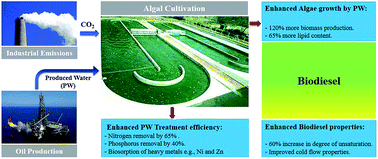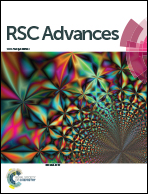Enhanced algal-based treatment of petroleum produced water and biodiesel production
Abstract
Millions of barrels of produced water (PW) are generated on a daily basis in petroleum-rich regions around the world. A locally isolated microalgal strain identified as Dunaliella salina was used to treat PW herein. The results showed that the application of the PW increased biomass production and lipid content by approximately 120 and 65% compared to the control (sea water), respectively. Consequently, significantly higher lipid productivity values (2–3.6 times) were achieved using the cultures enriched by different ratios of seawater and PW (1 : 1 to 3 : 1). Moreover, bioprospection by FAME profiling revealed that the inclusion of PW in the culture media altered some properties of the resultant biodiesel. More specifically, cold flow properties were improved by PW enrichment while oxidative stability was deteriorated. From the bioremediation point of view, the studied marine strain, D. salina coped well with the salinity fluctuations in wastewater and was found to be highly capable of removing nitrogen, by 65% and phosphorus, by 40%. Biosorption of toxic heavy metal pollutants such as Ni and Zn were also achieved at rates of approximately 90 and 80%, respectively. Overall, the integrated strategy presented herein seems very promising in minimizing the operating expenses of PW treatment while concurrently offering a sustainable platform to improve algal biodiesel production both in terms of quantity and quality.


 Please wait while we load your content...
Please wait while we load your content...